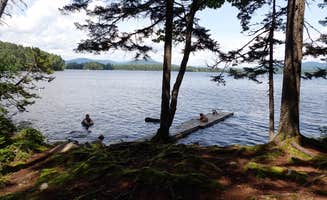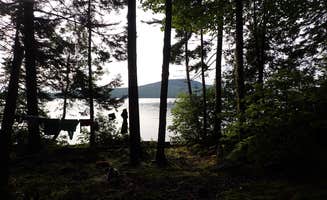Dispersed camping near Clarksville, New Hampshire includes several primitive sites throughout the North Country region. Located in Coös County with elevations ranging from 1,000-1,400 feet, the area experiences dramatic seasonal changes with heavy snowfall in winter and temperatures that can reach below freezing even in late spring. Several sites require advance registration through the Connecticut River Paddlers Trail system despite being free to access.
What to do
Paddling access: The Connecticut River provides direct access to multiple free campsites like Maine Railroad Trestle where "there is a registration page on the CT River Paddler's Trail Website that they ask folx to complete just so spots don't get overcrowded." The site includes "a really nice rocky beach with easy access for loading and unloading. It's also a nice spot to fish from."
Hiking options: Several campsites are accessible via foot travel on regional trails. The Forest Legacy Trail connects to Smudge Cove where visitors can "backpack in and enjoy some pretty cool Maine forests along the way." This trail system provides access to multiple lakeside camping areas with varying terrain difficulties.
Fishing opportunities: Many sites offer direct water access for fishing. The Dead River sites located between Rangeley and Stratton provide riverside camping. According to one camper at Rangeley-Stratton Road Camp: "There are three free campsites off Route 16 between Rangeley and Stratton, ME, located on the Dead River... They are located just after you cross the bridge over the Dead River on the left side of the road."
What campers like
Privacy levels: Remote sites offer considerable isolation from other campers. At Scott C. Devlin Memorial, campers appreciate that it is "well maintained and tucked on a knoll in a pine forest. There is a picnic table, fire ring and composting toilet box seat." The site provides "plenty of flat space for tents" in a secluded setting.
Water proximity: Lakefront and riverside sites allow direct water access. Smudge Cove features "a nice long dock that makes it super easy to boat into and unload" with "relatively easy access to the water by way of the rocks, beside the dock." The natural setting enhances the experience where "the only sounds you will hear at night are the loons!"
Quick escapes: Some sites work well for overnight stays. At Hogan Road Pulloff, one camper noted their "quick Saturday night with my pup" was at an "amazing lil spot, a pull off the wild rocky road. very private. right next to a serene view of the lake." This accessibility makes weekend camping feasible without extensive planning.
What you should know
Weather impacts: Rain can significantly affect site conditions. At Raven, despite being "in a beautiful spot perched above Cupsuptic Lake, it is so impacted that in the rain it was a literal mud pit." The campsite becomes challenging during wet conditions where "finding a spot to pitch a tent where water wouldn't puddle would be impossible."
Site limitations: Many locations have space constraints. Raven "is quite small and wouldn't be able to accommodate more than two small tents," making it unsuitable for group camping. Similarly, Eagle Cove has "very little clear flat area for an established campsite" requiring "a little bit of strategy to find a spot where we could actually sleep."
Permit requirements: Fire permissions vary by location. At Rangeley-Stratton Road Camp, "you only need a permit if you plan to have a fire." However, at Hogan Road Pulloff "no fires allowed here," making this a consideration when selecting camping locations.
Tips for camping with families
Site selection: Choose locations with stable access points for safety. Scott C. Devlin Memorial has a water entry with "a set of wooden steps that go down into the water at a relatively steep angle. Be sure you tie your boat up while unloading as there is a fair amount of current sweeping around the bend." This presents challenges for families with young children.
Wildlife awareness: Prepare for insect encounters. At multiple sites, reviewers warn about ticks. One camper at Scott C. Devlin Memorial notes: "Beware the ticks! They weren't the worst I've seen, but they are definitely around." Proper clothing and regular tick checks are essential for family camping.
Space planning: Assess tent accommodation needs. At Hogan Road Pulloff, there's "enough space to put up to 3-5 tents" making it suitable for family groups, while "plenty of trees to hang your hammock" provides options for different sleeping arrangements.
Tips from RVers
Road conditions: Access roads to dispersed sites vary considerably. At Hogan Road Pulloff, expect "about 1km (0.6 miles) of gravel road, easy enough for a big road bike, but don't go any further as it gets rough." Many reviewers recommend against attempting larger vehicles on these remote roads.
Parking limitations: Most dispersed sites near Clarksville accommodate only small vehicles with minimal turnaround space. For Hogan Road, one visitor noted seeing "only one truck in the evening and one in the morning," indicating the limited traffic but also the feasibility of truck access to some sites.
Water access alternatives: Consider boat-in camping options instead of vehicle camping. Eagle Cove and other lake sites are primarily "waterfront site[s] but there isn't super easy access to the lake," requiring watercraft for optimal use rather than RVs or large vehicles.






